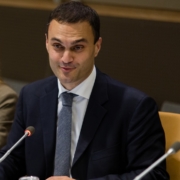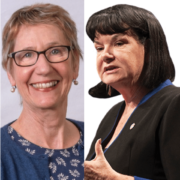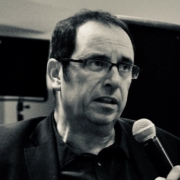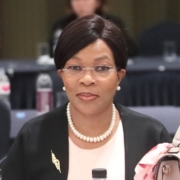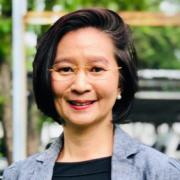Noah Sobe
UNESCO’s Futures of Education Project
Overview
In the past few episodes, we have spent a lot of time discussing the future: the future of unions, the future of the planet, the future of propaganda, the future of democracy and so on.
But how can we even begin to conceptualize the idea of future?
My guest today is Noah Sobe, Senior Project officer for Education Research and Foresight at UNESCO. Later this week at the UN general assembly, he will be joining others in the launch of a project entitled “Futures of Education: Learning to Become.” This new project aims to generate global engagement and debate on learning and knowledge in relation to the multiple possible futures of humanity and of the planet. In our conversation, we interrogate the meaning of the future and what this might mean for education.
Citation: Sobe, Noah, interview with Will Brehm, FreshEd, 173, podcast audio, September 23, 2019. https://freshedpodcast.com/futures/
Transcript
Will Brehm 1:43
Noah Sobe, welcome to FreshEd.
Noah Sobe 1:44
Thanks, Will. It’s great to be here.
Will Brehm 1:46
I look at the news today. I look at social media, and the idea of future comes up over and over and over again. Whether it’s the future of work, or the future of the planet, or the future of sustainability, it just seems to be this narrative that is very present today. Why are we talking about future so much today?
Noah Sobe 2:09
Yeah, I agree, Will. The future is everywhere. I think there is a whole set of people who think that right now the future is a more reliable guide for what we should do in the present than the past is. And so, given the challenges that we seem to feel within increasing severity, I think it is quite reasonable that we’re increasingly thinking about the future. I think though that, unfortunately, oftentimes, it’s done rather weakly. And it’s all too easy just to take the term “future”, and throw it on your conference presentation, or throw it on the title of your conference, you know. After all, in education, pretty much everything we do has a kind of now/then relationship built into it. Thinking about what has happened, what is happening, and what might happen.
Will Brehm 3:10
Right. And what should happen.
Noah Sobe 3:12
Yes, exactly. So, a future orientation is natural in education, but I think that in many instances, it’s unfortunately done a little bit weakly. So, to get into the future, I think you need to get a little bit philosophical and think about time. Because you know, the future is bringing us, inviting us, to engage with how we think about time, and our presence in time, and the flow of time. And Will, one of the quotes I like most is from Elizabeth Grosz, who maintains that there is “one and only one time, but there are numerous times.”
Will Brehm 3:52
And what does that mean to you?
Noah Sobe 3:53
It means that everything has its own distinct duration. Right? There is a time of this wooden table, a time of this pencil.
Will Brehm 4:03
A time of my life.
Noah Sobe 4:05
A time of a life, a time of an event. But that alongside each of these individual times, there is a kind of global or generic whole time that everything is woven and braided into. And I think that’s what lets us think in terms of earlier, now, later, and that’s what that idea of, kind of, overarching collective time is; what lets us help, lets us think about things past, present and future, you know. Let’s us think about, you know, maybe a kind of geological cosmic time that understands the existence of the planet in the universe before human beings. And possibly also to envision a geological cosmic time that will exist after the beings as we know them.
Will Brehm 4:56
Right. It doesn’t see humans as exceptional in any way.
Noah Sobe 5:00
Yeah. I mean, an argument about time as a natural fact is a visioning of human beings in location to that flow of a kind of overarching global time, within which there are multiple times would be Grosz’s argument. But I think the other piece that’s important is to also think about the important ways that, in addition to being kind of a natural fact, the future is a really important cultural fact.
Will Brehm 5:27
And what would that mean?
Noah Sobe 5:28
Well, there I am drawing on an idea that’s really nicely articulated by Arjun Appadurai, and that’s a reference to the future that kind of lives in us and through us. That’s the future that’s shot through with effect and aspirations, you know, and imagination. So, you know, anthropologically, you know, this is the sense of what is to come. Feared. What is hoped for. What might come. And of course, like how we forecast that future and how we place ourselves in it has huge consequence for the world. You know, the scenarios we envision are not just descriptive of the world, but actually, world-making,
Will Brehm 6:13
Right. The coming, in a sense. And Appadurai, he does talk about in his book. He has a quote that I love, it’s “Histories make geographies.” And the idea is that, yes, it is about future-making, but it’s very much about it has been made from the past as well. Right? There is that connection to, you know, the social fabrics of the world or of particular cultures that endure over time.
Noah Sobe 6:39
I think a good example of that, Will, is the modernist social planning and policy that develops after World War II, that we are still very much a part of. You know, that really pioneered some new ways of doing futuring work, right.
Will Brehm 6:57
Such as?
Noah Sobe 6:58
Well, sort of treating the future as an engineering project. The more that … this has, I think, been the feeling for a long time, and it’s still with us in some powerful ways. The more that the future can be rendered visible, the more it can be rendered governable, right. And we can think about all sorts of organizations, institutions that operate on that kind of governance of the future mode.
Will Brehm 7:22
But what would that look like in practice today then, or even in the post-World War II period like earlier on?
Noah Sobe 7:28
I mean it’s the Rand Corporation. It’s the World Bank. It’s actually modes that are also adopted by UNESCO. It’s a planning model.
Will Brehm 7:36
Right. So, would this look like something like: we are focused on increasing GDP per capita over time?
Noah Sobe 7:44
Exactly.
Will Brehm 7:44
And then that then makes us plan particular government policies in a particular way?
Noah Sobe 7:49
Yes, and I think what Appadurai helps me think about is seeing that mode of planning as, you know, an interaction with the future as a cultural fact, as a way of projecting it forward. It is also important that even as, you know, there are some movements, there are many to kind of control the future in a quest for certainty; we have also developed some pretty sophisticated techniques for managing uncertainty of the future, right. And you can think about risk analysis, risk management, risk futures. You can even think about the practice of future- proofing, right, which is an acknowledgement that you know, there is a deep complexity, uncertainty. In fact, maybe even a fundamental unpredictability to the future. But within that, we can still plan for it.
Will Brehm 8:40
Right, we’re still able to make things not obsolete. My product that I sell. The iPhone is not getting obsolete in the future, so long as Apple is planning, doing risk assessments on how to sell more iPhones.
Noah Sobe 8:52
Right.
Will Brehm 8:53
So obviously then, this notion of time and these notions of time that exist have serious consequences.
Noah Sobe 9:02
Yes, for sure. To be clear, I mean I think that what I’ve just been describing is actually very good and necessary futures work. And when I said earlier that sometimes the label “future” gets added to something that’s not doing anything like that, and that’s a problem. We do need to do some of this more, you know. We can even call it empirical work, where we look at trend analysis, we consider contingencies, and so forth. But alongside that, I think that there is a risk that if we spend too much time in this kind of anticipatory futures world, we diminish our ability to think about what’s possible. What’s possible that grows out of the past, right, and is connected to the present but diverges from it in ways that we struggle to imagine.
Will Brehm 10:03
Right. We don’t have metrics to capture what is unknown in the future.
Noah Sobe 10:07
Exactly. You know, Deleuze talks about the virtualization of potential as a way of trying to think. There are a lot of different ways of trying to get beyond the horizon of the known to think about futures of possibility. And I think that alongside predicted futures, we do need to, in this deliberate futuring work, we also need to think about possible futures.
Will Brehm 10:32
And so, what does that look like? What does it mean? Just creating space for them to happen. Because you can’t necessarily predict exactly what those possible futures are going to be like.
Noah Sobe 10:40
Sure. So, part of it is developing a comfort with moving away from prediction, and part of it is also having the confidence to kind of deliberatively, collectively engage in some of that visioning work that I think is a key part of doing all this futures attention.
Will Brehm 11:01
And when you’re talking about what you’re focusing on in the future and the unknown possibilities, we’re talking like across society, across economies, across polities, is that right? Like it can be, you know, it is imagining things, possibly beyond, I don’t know, authoritarianism, beyond democracy, beyond capitalism, beyond just sort of everything that we might think is normal and taken for granted today.
Noah Sobe 11:29
I think it’s certainly necessary to work within the frame of what we know. And at the same time, to use your word, Will, it’s necessary to work beyond, right. To think, “alright, what would a world look like, where this wasn’t present? Or where something new was present?” And that’s difficult, it’s difficult to imagine the new and the novel, but I think that’s the challenge. That’s the major challenges before us.
Will Brehm 11:57
And individually, intellectually, I get it. I understand these unknown possibilities and thinking beyond while also allowing for sort of the predictive work, empirically, that still has to happen. How do you do it institutionally within large structures like UNESCO, where you are currently working? How on earth you get these large structures that are maybe inherently quite conservative and slow, and, you know, this is what we all know from working in institutions, from universities to international organizations, but even small organizations like FreshEd, we sort of create these structures that are very difficult to imagine things beyond. So how are you doing that?
Noah Sobe 12:44
I mean, I think it takes moments of pause and reflection. And this is maybe a good time to go and talk a little bit about the Futures of Education project that I’m working on with UNESCO, that’s shortly going to be launched at the UN General Assembly in New York. This is an exercise that UNESCO has done kind of a quarter-century intervals. So, in the late 1990s, in kind of the shadow of a post-Cold War world, UNESCO, under the leadership of Jacques Delors, brought together a group of people that produced, in 1996, the ‘Learning: the treasure within’ report, which I think was a really important intervention into discussions about education globally. And then, prior to that, in the early 1970s, there was another similar kind of visioning intervention in the form of the Faure Report, just titled ‘Learning to Be’. It came out in 1973. So essentially, what UNESCO is doing right now is pausing to do that moment of reflection engagement. And there’s some significant differences with what we’re doing now and what’s been done in the past. But, generally, it’s to say, you know, from time to time, we do need to take those deliberate dives and deep dives into serious thought. So, while the 2030 agenda and the SDG goals are where a lot of energy is focused globally, and should be focused, at the same time, UNESCO and many other organizations, and our partners are looking beyond the 2030. And in fact, for this Futures of Education project, raising the horizon of 2050 and beyond. And I think that’s another step that’s useful for thinking outside of the constraints of where we are now and how we see where we are now, to kind of really do some visioning activities that think about the world we might have and the world we might want in 2050 and beyond.
Will Brehm 14:54
So, why did UNESCO decide to do this now?
Noah Sobe 14:58
I mean, I think it really highlights one of the important contributions that UNESCO itself makes in the global educational world. And that’s an ability to activate conversations and catalyze debates and bring people together to really carefully engage with something. And, you know, we’re thinking of this very much as an extension or new edition of the Delors report. The Commission will have some heads of state, some fantastic global intellectuals, some fantastic teachers from various parts of the world. The Commission will have an amazing set of thought leaders around the globe from a variety of different areas, including academics, teachers, people out of different kinds of worlds. So that’s the core, the Commission is going to produce a report for November 2021, on the Futures of Education. But this is an important feature where this process is going to be different than previous ones. Whereas in the Delors report, the committee went into a closed room and closed the door and the windows, we’re throwing everything open this time.
Will Brehm 16:09
What do you mean?
Noah Sobe 16:10
We’re embedding a whole set of consultations and inputs into it. And we’re also going to be reporting the discussions of the International Commission as they’re unfolding.
Will Brehm 16:21
In online space?
Noah Sobe 16:24
Yes, we’re developing a whole set of consultation modalities, where we’re even playing with some gamification around the futures of education. It’s fun and exciting stuff. But the basic idea is that alongside of the International Commission track, there’s a second track that is really focused on global engagement.
Will Brehm 16:44
So even the people listening to this podcast could actually participate in some way in this project.
Noah Sobe 16:48
Absolutely. Absolutely. In a variety of different ways. And we want, you know, add people interested in education, educational stakeholders, from all parts of the world to be engaged in this conversation, in this debate, and helping to shape it. So, the initial phase, we are going to kind of be focused on visioning. And then, at some point, after September 2020, we are going to be releasing some of the initial recommendations and findings of the International Commission for feedback and further discussion. And then, the Commission report will be finalized by November 2021.
Will Brehm 17:25
So, UNESCO is a member state organization. So, when you say recommendations, are you saying recommendations to member states?
Noah Sobe 17:31
It’s a great question, Will. And that’s actually another area where we’re expanding the ambit of this report. The mandate to the International Commission is to provide recommendations at all levels, not just to member states, but even to individual teachers, parents, students. How is it that we can think about education playing a role in making the futures we want to make?
Will Brehm 17:57
So, you are calling this report ‘Learning to Become’?
Noah Sobe 18:00
That’s right. You caught that as a subtitle, right.
Will Brehm 18:03
And it seems to be a clear take on the report ‘Learning to Be.’
Noah Sobe 18:07
That’s right. There’s a definite signaling.
Will Brehm 18:10
So, what’s the difference?
Noah Sobe 18:11
I mean you’re right that learning has been at the center of UNESCO’s efforts in education from the beginning. And let me mention three things that I think are core that feed into us thinking of Learning to Become as the title or subtitle of the report in the project. The first is that in thinking of learning as becoming, as a process of becoming, it’s very important to not consider it also anything that disqualifies anyone, right? Yes, clearly, at its core, education is about a now and a then; it’s about a learning something in the now for the future. But, you know, human rights, commitments to the rights of the child have fully enshrined the idea, appropriately, that even the youngest members of humanity possess dignity as persons. And so that even in their capacity as human becomings and all of our capacities as ongoing human learners and ongoing human becomings, you know, we enjoy the status of persons, right. So, engagement and learning doesn’t disqualify, right. And in some ways, this is simply captured in John Dewey’s idea of, you know, education is life and not preparation for life, right. So, the concept of learning to become, I think, is echoing, some of that. Life is about becoming, in many ways, as learning is. So, the second thing is learning to become is in part nurturing a capacity to imagine. It’s about the capability to envision for oneself a fulfilling life. It’s about the anticipation of futures and how I can envision and then how I can realize. And education is in many ways about, you know, providing people with those capabilities, right, it’s about enhancing those capabilities. At the same time, we have to recognize that around the world, there are many people who live in such extreme conditions of poverty or exclusion or violence, that the future is either something they can’t think about or is such a scary thought that it’s to be avoided.
Will Brehm 20:28
It’s a privilege to think about futures.
Noah Sobe 20:29
In a lot of ways. Absolutely, absolutely. So, I mean addressing that, you know, means addressing structures of oppression. It means addressing the maldistribution of resources. But within that, I think we also need to set the development and furtherance of the capacity to imagine as a key important educational end. And I would say that’s important for sure in resource-poor settings. But it’s also important in resource-rich settings, you know, where the purposes of life and the purposes of learning need to be clearly part of the conversation for learners.
Will Brehm 21:09
And what was the third?
Noah Sobe 21:10
So, the third is the question of what we want to become. If you know, an Israeli historian, Yuval Noah Harari, who’s written some interesting books on the history of Homo Sapiens. The second book is on entitled Homo Deus. And he asks us to take seriously the idea that the next stage of human history isn’t just going to feature technological change, or you know, the kind of continued transformation of human cultures and human societies that seems obvious. But he envisions a not-too-distant future where there is the potential for fundamental transformations in human consciousness and human identity. And we can point to biotechnology, we can point to artificial intelligence, but Harari suggests that really, the question we need to have, the front and foremost is, you know, “What do we want to become?” And those are questions that resonate deeply with UNESCO’s vision of humanism as something that’s constantly transforming and emerging. That question is one of the key ones we’re going to address in this process. But it’s one that humanity needs to keep addressing. Because, clearly, we have to become something we have not yet become.
Will Brehm 22:31
Right. So even when the report is finalized, the project is not over. The process doesn’t end with the final printed document.
Noah Sobe 22:39
That’s quite human, isn’t it?
Will Brehm 22:42
The other thing that I noticed when I read some of this report is it’s not future that you’re talking about. You’re talking futures. And that seems a bit different from maybe the everyday talking that we’ve seen in so many different contexts of thinking about ‘the future”. Why plural?
Noah Sobe 22:59
I’m really glad you picked up on that, Will because that’s a key part of this. So, it is quite intentionally called the Futures of Education Project. And I think that for too long, we have, and in a limited set of places in the world, envisioned one future. And in fact, one of the problems of the contemporary world is this scarring history of imposed futures. So, in one sense, to talk about the futures of education is an empirical recognition that really there will be multiple futures to education, but to the planet. And it’s also a recognition that there should be, and that people should have … play a key role in shaping the future that they want and that those futures are going to look different, in different places for different people.
Will Brehm 23:50
Right and future is not going to be distributed evenly globally. Plus, people might envision different futures for themselves in their societies.
Noah Sobe 23:58
Right. There is inevitably going to be unevenness. I think it’s important, though, that we don’t vacate the future and consider it this canvas for technological enlightenment. I think we have to consider the future fundamentally as a moral category. And we have to approach the future as a space for democratic decision.
Will Brehm 24:20
Well, Noah Sobe, thank you so much for joining FreshEd, and best of luck in your futures.
Noah Sobe 24:24
Thank you, Will. It is a pleasure.
Translation
Coming soon!
Resources
Coming soon!

